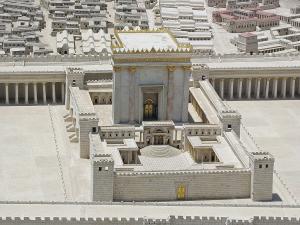
We are called to be temples of God, that is, to have God dwell within us. When that happen, as St. Antony the Great indicated, we will be able to be good. This is because when we have God dwell within us, we are able to participate in and share in God’s goodness: “Abba Antony said: ‘A man is never good, even if he wants to be good. Unless God dwells within him: ‘There is none good but one : God’ [Mk 10:18].’” [1]
How, it can be asked, are we able to become temples of God? How can God, who infinitely transcends us, be said to dwell in us? There are many ways in which this question can be answered. One way would be to address not just the transcendence of God, but also the immanence of God, showing how the two work together in God’s omnipresence. However, it seems that something more is implied than God’s omnipresence when we talk about God specifically dwelling within us as if in a temple; such words suggest a special kind of presence, a sanctification which is not connected to God’s normal presence in the world. St. Isaac the Syrian tells us one way to answer the question lies not in God’s nature, which is indeed transcendent, but in God’s uncreated energy (energies), especially God’s glory. For those energies give us something which we can apprehend, various qualities of God which we can take into ourselves and join in with so that we can be said to participate in them ourselves:
As to how it is said that <God> abides or dwells, it is not in His nature but in His glory and in his energy that He abides, in the place set apart for His holiness – whether this be in a building made by hand and in things not endowed with reason called vessels of His sanctuary, or in the rational temples which are the souls. It is the power and energy <of God> that sanctifies and sets apart from the other souls that soul in which the Lord is sanctified, by means of the remembrance of Him; by the manifestation of a revelation and the knowledge of the mysteries revealed in it, and not by an inhabiting of the divine Nature <in us>.[2]
God’s uncreated energy and glory can come upon many things, not just us. This is how God was able to dwell in the Temple in Israel, even as God’s presence could be and was found with the Ark of the Covenant. We now can find God dwelling in us in a similar fashion, so that we can use what we learn of God’s presence in the Temple to understand God’s presence in us, and why, then, we can be said to become temples of God.
When we find ourselves engaging God and God’s energies in our lives, cooperating with them, integrating them into ourselves so that our actions. We are to coordinate ourselves with God’s activities, we join in with them, and by doing so, we can even be said to participate in the divine life. The more we do this, the more we will participate in the divine life, granting us a greater presence of God within us. Thus, for example, if we want God’s mercy, we must also show mercy:
If a man desires to obtain mercy in heaven, he should bestow it in this world. Therefore, since all want mercy, dearly beloved, let us make her our patron in this life so that she may free us in the life to come. Mercy abides in heaven, but it is reached by the exercise of it on earth. [3]
The more mercy we share, the more we will be found cooperating with divine mercy, indeed, we will be seen incorporating it in ourselves, so that the more mercy we share, the more we will receive in return. This is true with God’s other qualities and the actions which are associated with them. The more we act in unison with them, the more we will find them coming into us and transforming us from within, so we will be seen to reflect more and more those qualities; but as those qualities have a never-ending depth to them in God, so we will find eternity is a never-ending journey of theosis, ever growing to be more and more like God. We will never be able to comprehend them, even as we are unable to comprehend God. But, of course, the more we take on those qualities, the more we reflect them in ourselves, the more we find God is dwelling with us, and so the more we will be able to understand and appreciate God in our lives, showing us how and why it can be said we will not apprehend anything about God without God:
For just as the Sun cannot be seen without the Sun, and just as the air cannot be heard without air, but the eye filled with light sees light, and the ear full of air hears air resounding, so God cannot be known without God. The soul, however, being filled with God, lifts itself toward God to the extent it both recognizes God when illumined with divine light and thirsts for Him when set aflame by divine heat. For the soul is not raised towards that which is above and infinite, unless it is raised up by a higher, infinite power. Hence, the soul is made a temple of God, as Xistus the Pythagorean reckoned. [4]
To apprehend God, we need God to be dwelling within us. But, as we have seen, God can be said to dwell with us through our coordination and integration with God’s activities, the uncreated energies, meaning, there are a variety of ways we can have God in and with us, providing us a variety of ways to apprehend God. Beauty, goodness, truth, mercy, and love are among those qualities, so that, when we engage them in and with our lives, and in the world around us, even if we do not know it, we are engaging God and having God’s presence with us. Through them we come to know something about God, though we might not know it, which is why many people can apprehend God without knowing they are doing so: the term God is itself a title and quality, one which they have yet to associate with that which they have properly apprehended. This is also why in the last judgment, many who do not know they were working with and apprehending God through their actions, will find that is exactly what they were doing, and so see, finally, God’s work in and with them, and they will rejoice when it is made clear to them. But those of us who understand the relationship of those qualities with God, will also find that what we thought we knew and understood is far less than reality, and we, too, will find the judgment of love a time of revelation, showing us also, all the ways we have engaged God, ways we have had God dwelling in us, without knowing it. This is why, though it is important to have God dwelling within us, we must not think this means if we do not recognize God working in and with us, God is not there. God is always there. What we have eternity for is to find out all the ways God is there and to rejoice in all of them.
[1] John Wortley, trans., The Anonymous Sayings Of The Desert Fathers: A Select Edition And Complete English Translation (Cambridge: Cambridge University Press, 2013), 619 [N 759].
[2] St. Isaac the Syrian, “The Third Part.” Trans. Mary T. Hansbury in An Anthology of Syriac Writers From Qatar in the Seventh Century. Ed. Mario Kozah, Abdulrahim Abu-Husayn, Saif Shaeen Al-Murikhi and Haya Al Thani (Piscataway, NJ: Gorgias Press, 2015), 361 [VIII.13].
[3] St. Caesarius of Arles, Sermons Volume I (1-80). Trans. Mary Magdeleine Mueller, OSF (New York: Fathers of the Church, 1956), 127 [Sermon 25].
[4] Marsilio Ficino, On the Christian Religion. Trans. Dan Attrell, Brett Bartlett, and David Porreca (Toronto: University of Toronto Press, 2022), 51.
Stay in touch! Like A Little Bit of Nothing on Facebook.
If you liked what you read, please consider sharing it with your friends and family!
N.B.: While I read comments to moderate them, I rarely respond to them. If I don’t respond to your comment directly, don’t assume I am unthankful for it. I appreciate it. But I want readers to feel free to ask questions, and hopefully, dialogue with each other. I have shared what I wanted to say, though some responses will get a brief reply by me, or, if I find it interesting and something I can engage fully, as the foundation for another post. I have had many posts inspired or improved upon thanks to my readers.












